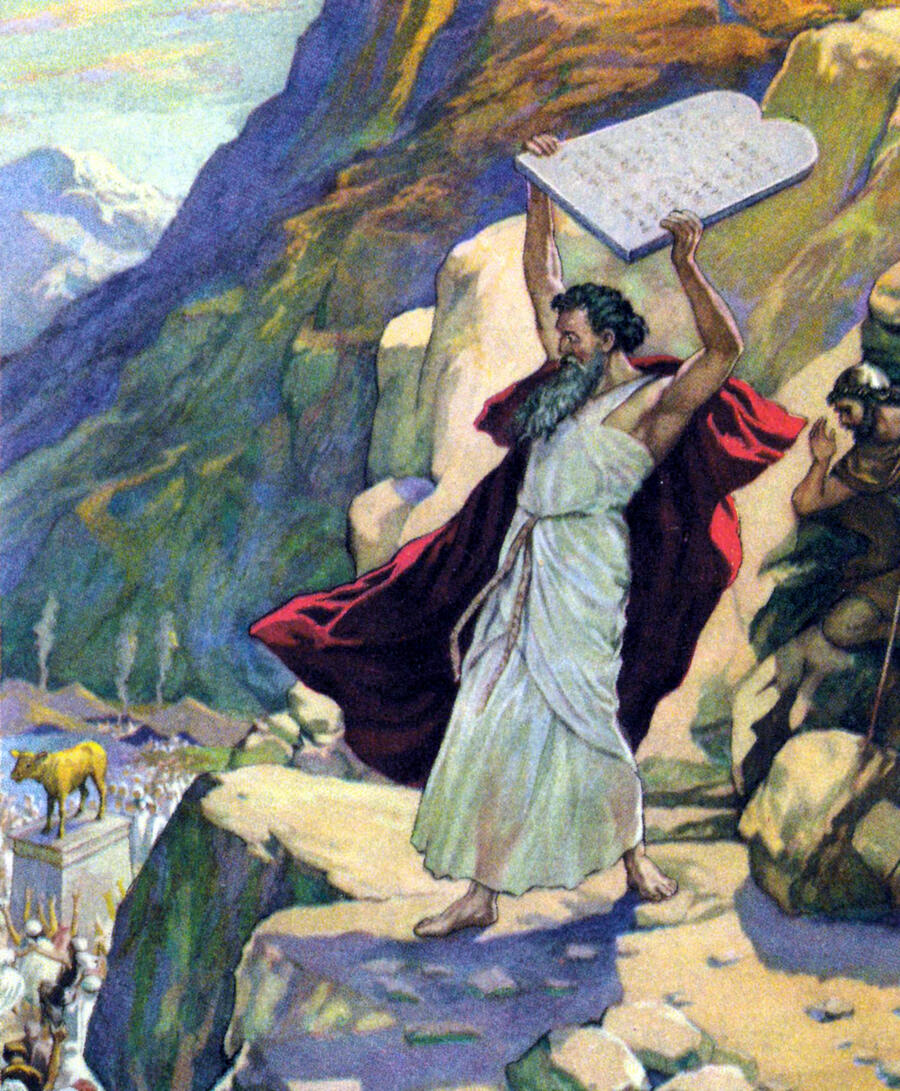
Contact: [email protected]
Click above for story text
Click above for story audio
Click above for story text
Click above for story audio
Click above for story text
Click above for story audio
Click above for story text
Click above for story audio
Click above for story text
Click above for story audio
Click above for story text
Click above for story audio
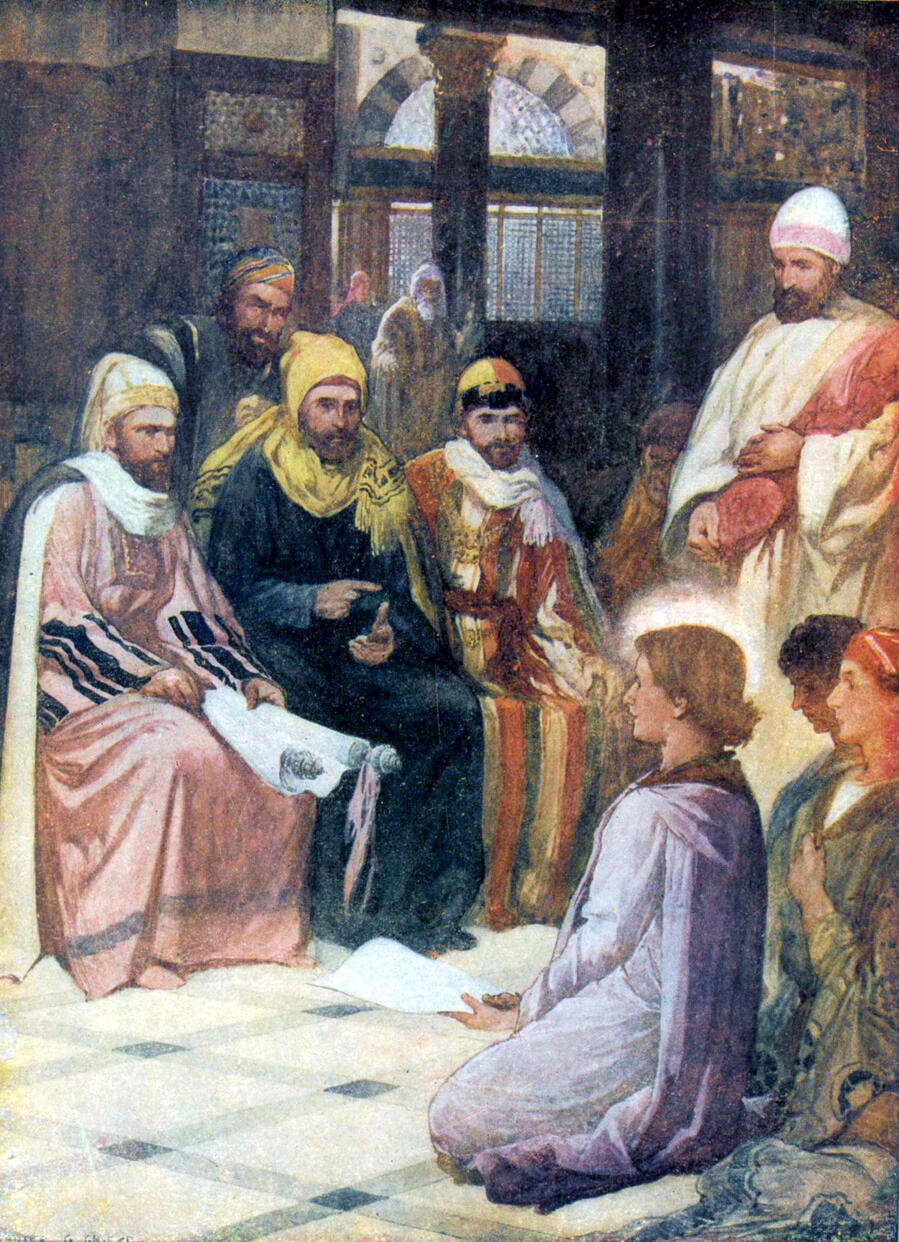
The Passover Feast
From the Gospels
This is a story of when Jesus was twelve and beginning to grow up.
Every year Joseph and Mary had been in the habit of taking a journey to Jerusalem, to attend the Passover Feast. This was a great occasion for the Jews.
Crowds and crowds of people from all parts of the country were going, and the feast lasted for a whole week; and as there was not room in the city for such multitudes, they slept in tents, or built booths of boughs of trees. It was quite warm and sunny, so this was very delightful. Many men walked, placing the women on donkeys, and the boys walked or got lifts given them by kind friends. The people sang as they travelled, and chattered and laughed, and told each other the news.
The road went up and up towards the end, for Jerusalem is built on a number of hills, and can be seen a long way off. Now whether the family from Nazareth lived for the week in a tent or a booth, or whether they had friends in Jerusalem who lent them a room, we do not know; but Jesus went to the Temple, and heard the service, and saw the sacrifices. Perhaps He saw the King, and He certainly saw the Roman soldiers whom the Jews hated so.
At last the time came for going back to Nazareth; but when Joseph and Mary had gone some way on their homeward journey, they found that Jesus was not with them. Still they did not trouble themselves, for they thought He was with some of their relatives amongst the company. But after a whole day’s travelling, they discovered that Jesus was not there, and that no one had seen Him or knew where He was.
At this news they were filled with alarm, for it was dangerous to travel in those days, and even in Jerusalem great harm might happen to a young country boy. So they left the company, and went back alone along the road to Jerusalem. But how could they find one boy in that crowded city? It was now the third day since they lost Jesus and they were quite worried. We do not know what made them think of going to the Temple, but they did go; and what was their astonishment to find the youthful Jesus sitting among the learned men, listening to their wisdom, and busily asking and answering questions.
The learned men were quite amazed at the insight of this young lad. You see, they had forgotten all about the Baby King of the Jews who had been born in Bethlehem, and only thought of Jesus as a country boy from Nazareth—a town they despised.
You can imagine how delighted Mary was to find her Son alive and unhurt; but she forgot for a minute that whatever He did was right. With a flash in her eye, she said, “Son, why have you treated us so? Behold, your father and I have been looking for you anxiously.”
Jesus answered: “Did you not know that I must be about My Father’s business?”
Mary and Joseph looked at each other and did not understand what he was saying.
But seeing the trouble in His mother’s face, and in Joseph’s face, He got up at once and left the learned men, and went straight back to Nazareth, where He lived in quiet obedience to his mother and foster father. And Mary, as she watched her Son grow in wisdom and stature, pondered all these things and kept in them in her heart.
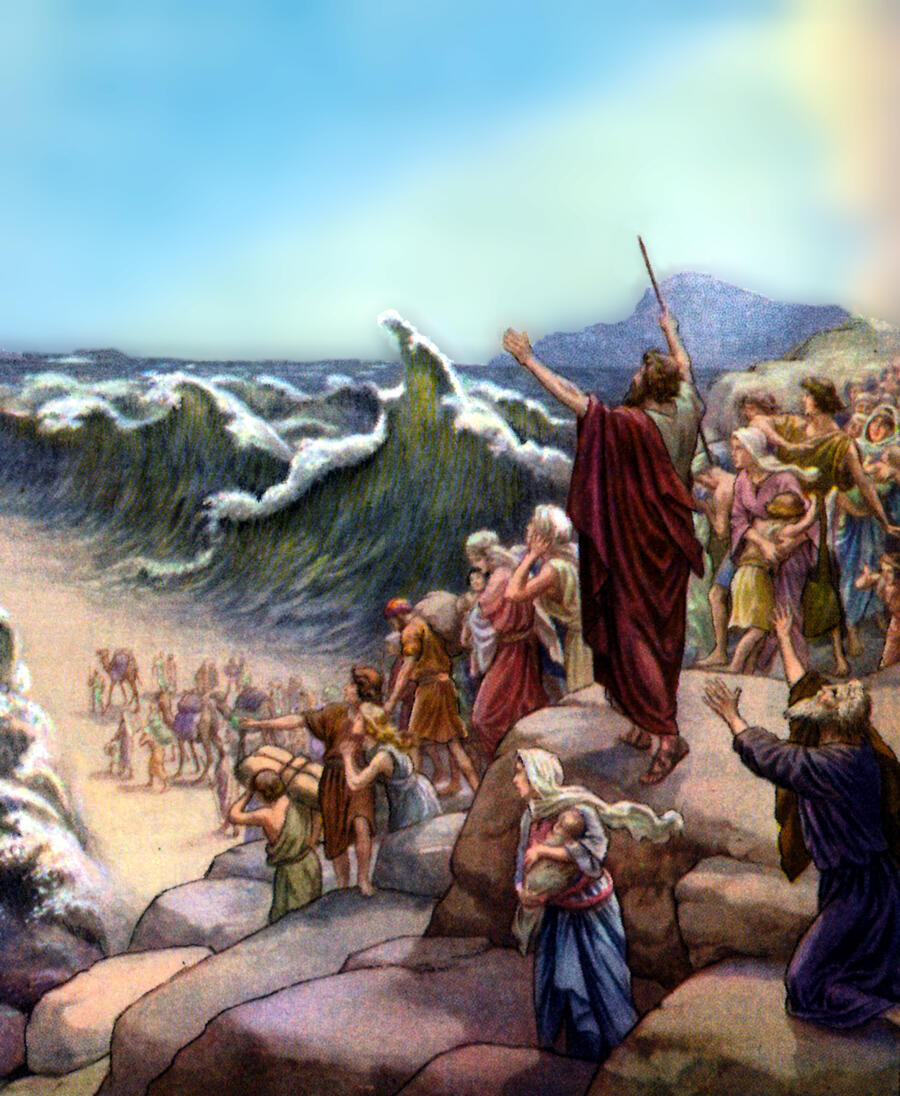
Over the Red Sea
From the Old Testament Book of Exodus
When Pharoah refused to let the Israelites go to worship God in the wilderness, God sent ten plagues on the land of Egypt. First the waters of the river turned to blood, and then came a plague of frogs. And still Pharoah’s heart stayed hard. Plague after plague afflicted the Egyptians and at last Moses warned the king that all the first born of the land would perish if he did not relent. And so it happened. Only in the territory of the Israelites were the houses passed over and the inhabitants spared. Moses had commanded the Israelites to eat a special meal staff in hand and with their sandals on their feet. And indeed, that very night, Pharoah told Moses to take his people and depart.
The Egyptians were so terrified of them by this time that they gave them presents of gold and silver, and jewels and clothes, and hurried them off. There were a very great many of the Israelites, and they took everything they possessed, and their sheep and cattle.
The nearest way to Canaan was along the traders’ road, but they would have to pass through the land of some friends of the Egyptians, who might have fought with them. So God told Moses to guide the people another way.
God sent a pillar of cloud to go before them by day, and a pillar of fire by night, to show them which way to go. But it seemed that even yet their troubles were not over, for as soon as Pharaoh learned that the people had really gone, he changed his mind, and made ready six hundred chariots with their captains; and, riding in his own chariot, he pursued after the Children of Israel, determined to bring them back into bondage. The Egyptian host caught up with them just as they were encamping by the sea.
Oh, how terrified the people were—fathers and mothers and little children! They saw the army of Egypt coming after them and they completely lost heart.
They cried in their distress to Moses and blamed him for having brought them out of Egypt. But Moses stood up bravely, and cried:
“Do not fear; stand and see the salvation of the Lord, which He will show to you today; for the Egyptians who you have seen today, you will never see again. The Lord shall fight for you, and you need only be still.”
Then God said:
“Tell the Children of Israel that they are to go forward.”
How could they go forward? For the sea completely blocked their path and they seemed hemmed in on all sides.
But Moses knew that God would save them, and at God’s command, stretched out his hand over the sea. God sent a strong wind which drove the water back on either side of them, and left a path of dry ground for the people to pass over, right through the midst of the seabed.
When the Egyptians saw what was happening, they followed after them; but the chariots' wheels began to become clogged and the army was thrown into confusion. So the Egyptians began to fear greatly, and they cried out, as the morning dawned:
“Let us flee from the face of Israel; for the Lord is fighting for them.”
But now it was too late, for the Lord said to Moses:
“Stretch out your hand over the sea, that the waters may come again upon the Egyptians, upon their chariots, and upon their horsemen.”
So the waters came rushing back once more, and all Pharoah’s chariots and horses, his captains and his soldiers, were drowned. There remained not so much as one of them alive. The Israelites saw the Egyptians dead upon the seashore and the people feared the Lord, and believed in Him and His servant Moses.
Miriam, the sister of Aaron and Moses, took a tambourine in her hand and led all the women in a joyful dance. Miriam sang:
“Sing to the Lord, for he has triumphed gloriously.
He has thrown the horse and his rider into the sea.”
Then Moses led Israel on into the wilderness of Shur; and they went three days in the wilderness, and found no water. When they came to Marah, they found that the water was too bitter to drink. So the people again murmured against Moses, saying, “What shall we drink?”
Moses called out to the Lord and the Lord showed him a tree, which Moses threw into the water, and the waters were made sweet. Then they traveled on to Elim, where there were twelve springs of water and seventy palm trees. And there they camped for a while.
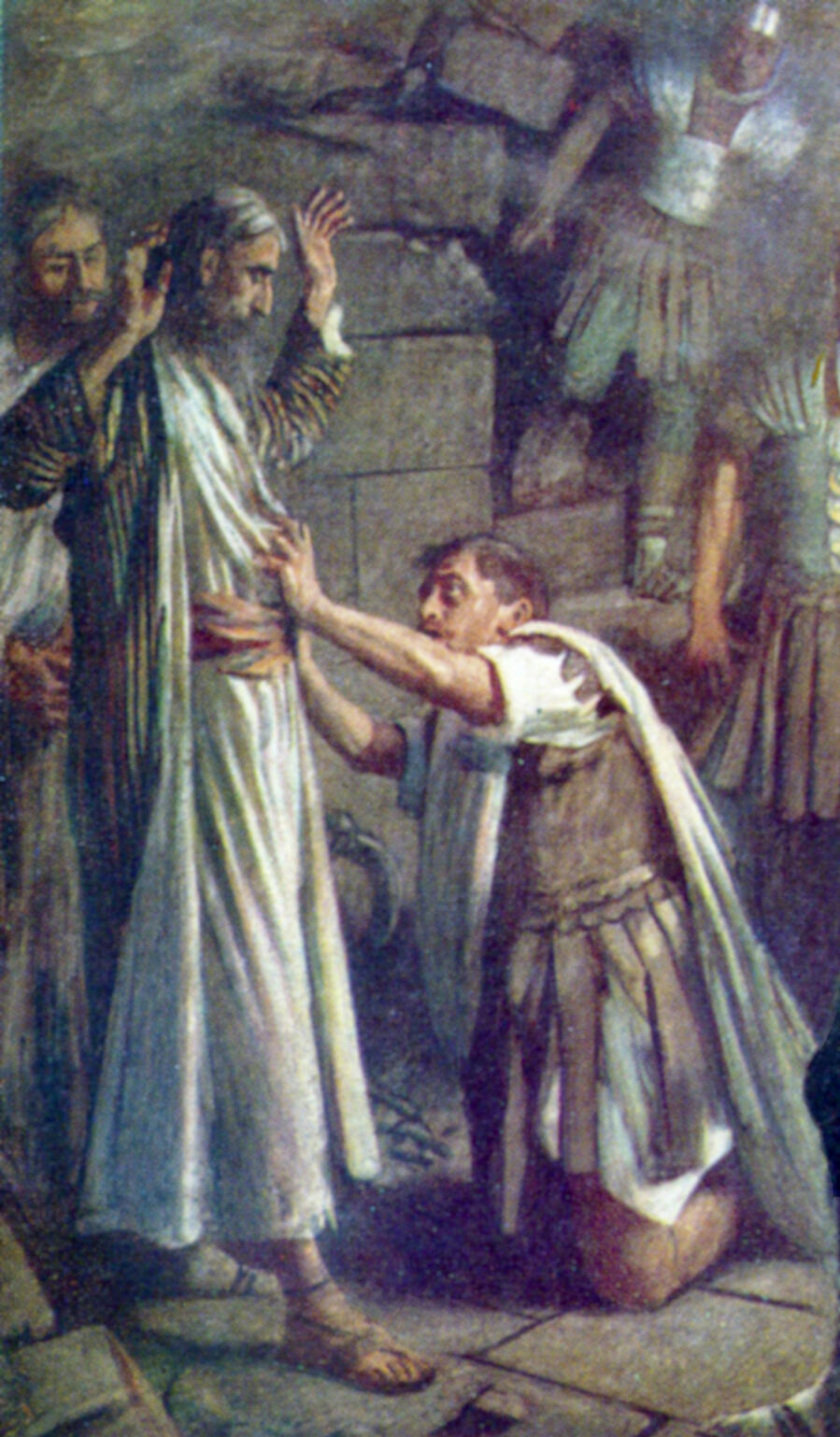
Paul and Silas at Philippi
From the New Testament Book of Acts
Once on their missionary journeys, Paul and Silas came to the city of Philippi, where there was no synagogue but where they found that a few women gathered together by the side of the river to pray to God. One of them was named Lydia. She was a wise and. wealthy woman who sold beautiful cloth, dyed purple and other rich colours.
The Lord opened Lydia’s heart to believe all that Paul said, and very soon she asked him to baptize her and all her servants and relatives who lived in her house.
“If you have judged me to be faithful to the Lord,” she said, “come into my house and abide there.” How delightful and cheering it was to find a home in that strange city!
Day by day, as Paul and Silas went down to the riverside, more and more people gathered to hear them.
Amongst these crowds there was a poor young slave girl, who was afflicted with an evil spirit of divination and told fortunes for money. When she saw Paul and Silas, she cried out excitedly: “These men are servants of the Most High God, who proclaim to you the way of salvation.”
This she did day after day, and it was so pitiful and so disturbing that at last Paul turned towards her annoyed and said to the evil spirit: “I charge you, in the name of Jesus Christ, to come out of her.” And the evil spirit came out the same hour.
How joyful the young slave girl must have felt to be set free. But not so her masters, who got all the money which she earned. In revenge, they caught Paul and Silas and dragged them before the local Roman magistrates.
They told that Paul and Silas were Jews, and that they were troubling the city.
The magistrates, instead of trying to find out the truth, watched the temper of the crowd who had gathered; and they commanded that Paul and Silas’s clothes should be torn off them, and had them beaten mercilessly and threw them into prison.
The jailer knew he would have to answer for the safety of the prisoners with his own life. So he put them into the inner prison, and fastened their feet in the stocks; and there they sat in the cold and the darkness, enduring the torture of their poor bleeding backs.
But at midnight, Paul and Silas could be heard by the other prisoners praying to God, and singing praises in sacred hymns and beautiful psalms. How could these men be so joyful?
Then there came a mighty earthquake, so that the foundations of the prison were shaken, and immediately all the doors were wrenched open, and the staples in the walls which held the prisoners’ chains became unfastened.
The jailer, who had been sound asleep, sprang up in terror, thinking that all the prisoners must surely have escaped, and instantly drew out his sword to kill himself. Paul called to him: “Do yourself no harm, for we are all here!”
Calling for a light, the jailer sprang into the dungeon, and, trembling with fear, fell down before Paul and Silas. He ordered them to be brought out of the vile dungeon, then he said anxiously and with humble respect:
“My lords, what must I do to be saved?”
And they answered:
“Believe in the Lord Jesus Christ, and you shall be saved!”
So Paul and Silas spoke of Jesus Christ to the jailer and all his household, and before morning dawned they had all become Christians and were baptized.
But the jailer took care to wash the bruised bleeding backs of his guests, and put ointment on them, and gave them refreshing food and drink.
In the morning the magistrates sent to the jailer, saying: “Let these men go.”
Now Paul was a free-born Roman. So he sent back a message, saying:
“They have beaten us openly and uncondemned, being Roman citizens, and have cast us into prison; and now they would thrust us out secretly? Let them come themselves and fetch us out!”
The magistrates were terrified when they heard that they were Roman citizens, and hurried off at once to the jailer’s house and implored their forgiveness and begged them to come out of the prison and leave the city.
So Paul and Silas came out, and went straight to Lydia’s house, and comforted her and all the brave men and women who had dared to become Christians. Then they went on to preach Christ in another city.
Text
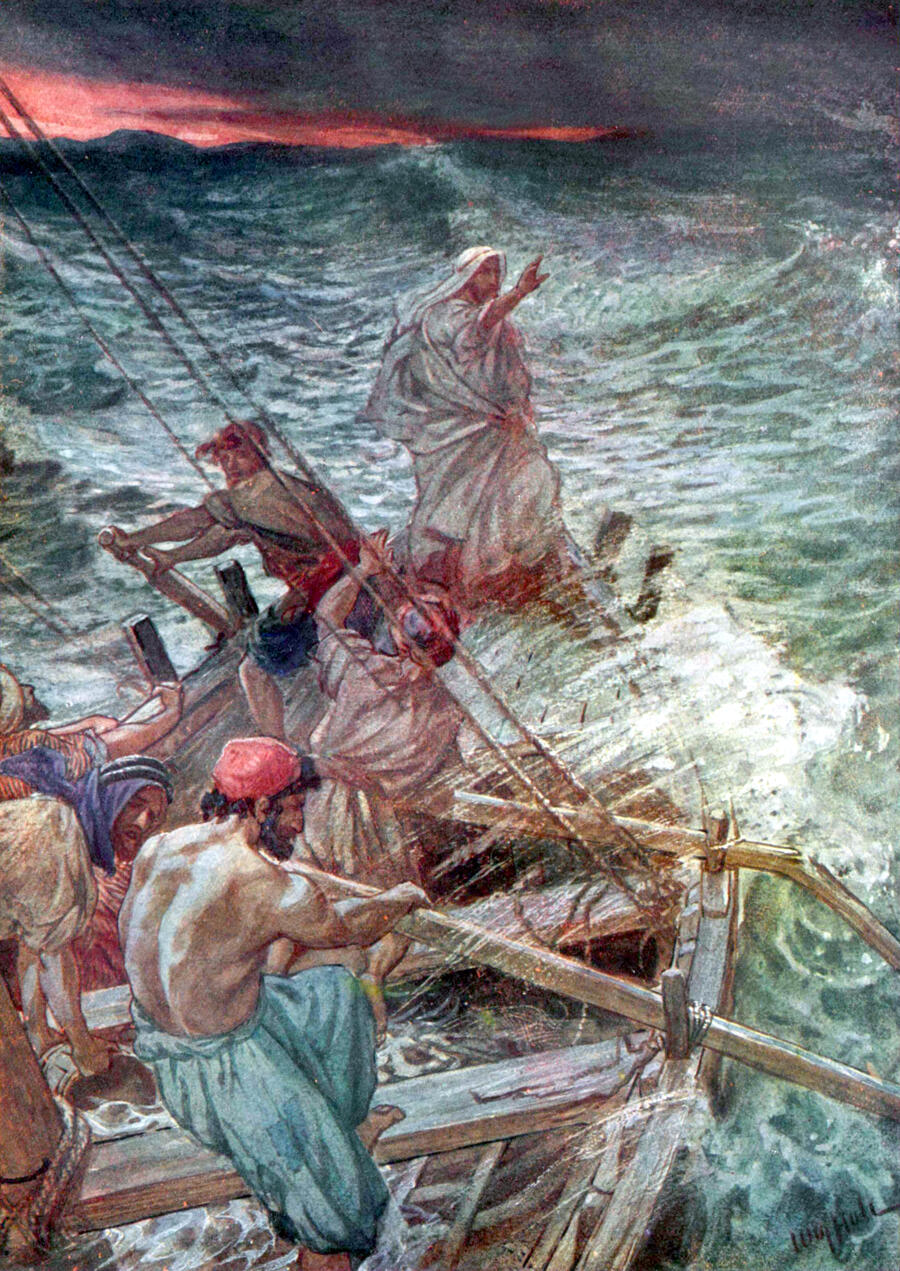
The Storm on the Lake
From the Gospels
The country round the beautiful little Sea of Galilee was the scene of much of Christ’s work. Once He had been so very busy there, teaching and healing, that at last, quite tired out, He told His disciples to row Him across to the other side of the lake, where the country was lonely and quiet.
While Peter, one of His disciples, was getting the boat ready, a man came up to Jesus and said:
“Master, I will follow you wherever you go!”
But Jesus answered: “The foxes have holes, and the birds of the air have nests, but the Son of Man has nowhere to lay His head!”
By that, Jesus meant that anyone who followed Him must be ready to leave his comfortable home, and not know from day to day what would happen to him. Jesus knew that some of the people who were listening to Him thought that perhaps He was going to be a great and rich man, and that if they followed Him they would themselves be great and rich and powerful. But as you read His story you will learn that Jesus Christ did not come down to earth to be rich and great, but to be the Friend of the poor and the despised, and to teach men and women of their Father in Heaven, and in the end to give His life as a ransom for many.
But now the boat was quite ready, and the disciples, who were getting anxious about their weary Master, urged Him to get into it. They made Him lie down at the back of the boat, and gave Him the steersman’s leather cushion on which to lay His head.
The disciples were sorry to see that, as they started, many people jumped into other small boats, thinking that they would also cross the lake and meet Jesus on the other side. But Jesus was too tired to notice anything, and He went quietly to sleep.
Now in that small lake, partly surrounded by hills, the storms come very suddenly; and before very long, the boat began to pitch and toss violently. Then the waves came dashing into it, so that the disciples, skilled fishermen though they were, were greatly afraid that the boat would be swamped, and that they and their Master would be drowned.
But Jesus still slept on, even though the spray dashed over Him, and the wind blew cold against His face. It amazed the disciples that the Master should sleep so quietly through such a terrific storm. At last they grew so terrified that they woke Him with the cry:
“Master! Don’t you care that we are perishing?”
Then Jesus opened His eyes, and, lifting His head, saw the storm, and rose upright in the boat. In a commanding voice He rebuked the wind for rousing the sea to this tempest, and said to the waters:
“Peace—be still!”
Then the wind obeyed the Lord of all things, and fled away; and the moment the wind had gone, the troubled waters sank down and there was a great calm.
As the disciples looked in astonishment at the quiet sea, Jesus said to them:
“Why are you so afraid? Why is it that you have no faith?”
Jesus thought they might have trusted Him, and been very sure that they could not be drowned, since he had told them they were going to the other side. But even the gentle words of the Master did not stop their fears, for amongst themselves they still whispered anxiously:
“What manner of man is this, that even the wind and the sea obey Him?”
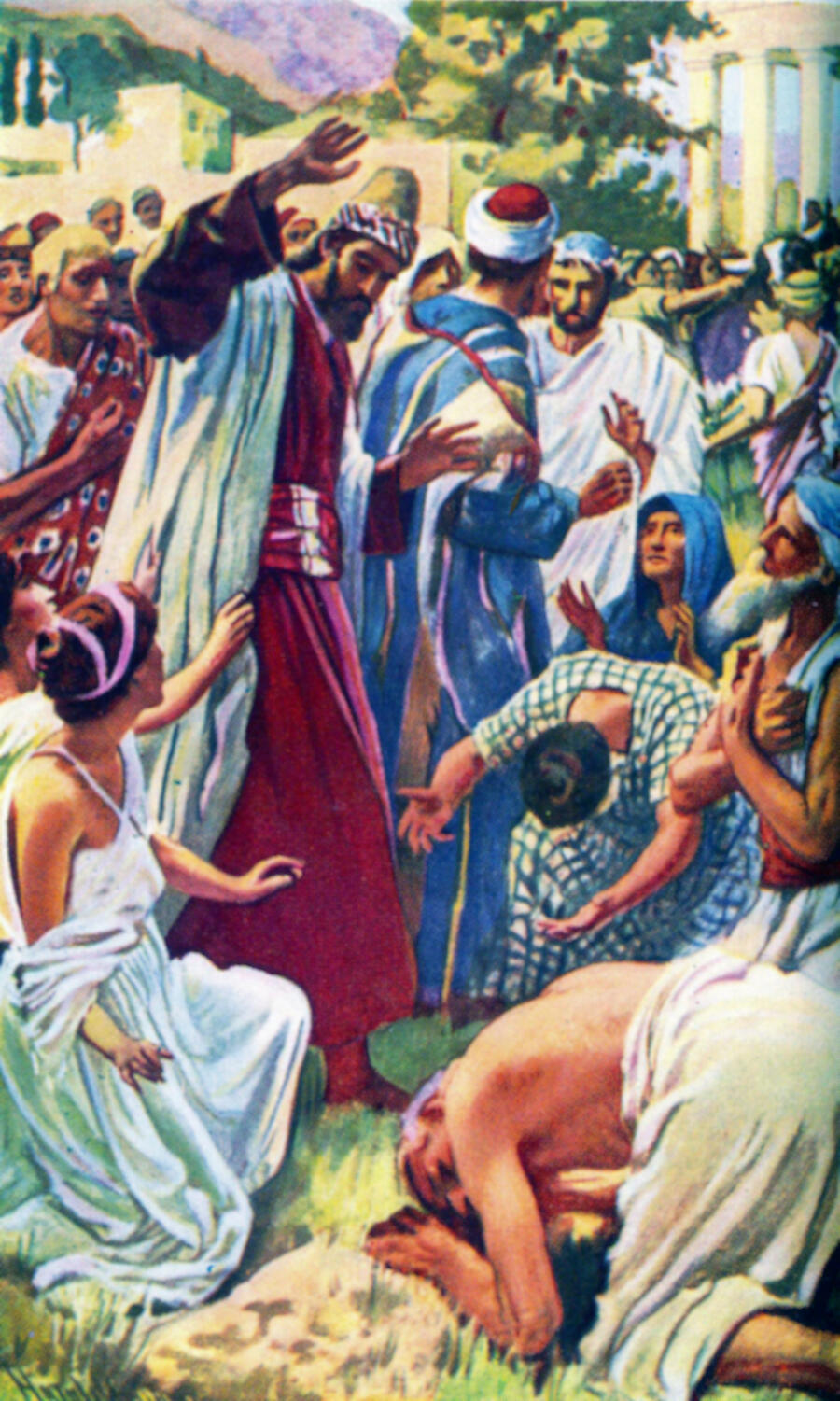
Paul at Lystra
From the New Testament Book of Acts
Saul, who we last heard about escaping from Damascus, had another name, Paul, and this is what we shall use for the rest of the stories about him.
For some years after he became a Christian, he lived in his own city of Tarsus; but the time came when God sent him on many long and dangerous journeys to preach about Jesus Christ.
On one occasion, Paul and his companion, Barnabas, went to a city called Iconium. Here they preached to the people and did many miracles and wonders, and the people welcomed them gratefully, and began to think that God must indeed be with them. But all this happiness was soon spoilt, for the Jews began to say horrible things about Paul and Barnabas, and tried to persuade the people that they were very wicked men.
The men who were against Paul and Barnabas showed their true wickedness by plotting to catch them and have them stoned to death; but happily the Christians heard of this, and they warned Paul and Barnabas to flee from the city, so that they might escape to the small town of Lystra.
There they began preaching as boldly as ever, and working miracles, as they had done in Iconium.
There was a man there who had been lame from birth, and the moment Paul saw him, he knew that the poor man believed that the Spirit of Jesus Christ could heal him. Therefore he cried out, so that all the crowd could hear:
“Stand upright on your feet!”
So the man leaped up and walked, and praised God, and followed Paul and Barnabas.
The crowds were amazed, for they had never seen such a thing before, and they shouted out:
“The Gods are come down to us in the likeness of men!”
They worshipped many gods, and as they looked at Barnabas, they thought that surely their great god Jupiter had changed himself into a man and come down to earth. And when they looked at Paul and saw that he was the chief speaker, they thought that he must be their god Mercury, Jupiter’s messenger and spokesman.
So, full of the wildest excitement, they rushed away to tell the priests of Jupiter and Mercury that the gods had come; but Paul and Barnabas went on preaching, never guessing what they now meant to do. What was their surprise and horror to find, a little later, that the priests were coming towards them at the head of a great procession, bringing oxen garlanded with flowers, as offerings to Paul and Barnabas. After the procession there followed a vast crowd of excited people, anxious to do honor to their gods. When the Apostles fully understood what was happening, they rent their clothes as a sign of grief and distress, and rushed hither and thither among the people, trying to explain to them that they were not gods, but were simple men, come to preach about the one true God in Heaven and His Son, Jesus Christ. They cried out:
“We also are men like you and preach to you that you should turn from these vanities to the living God, which made heaven and earth, and the sea, and all things that are in them.”
At last, after great difficulty, they stopped the sacrifice; but the people were dreadfully disappointed, for they had thought that Paul and Barnabas were their own great gods.
And very soon their disappointment turned to anger, for some of the wicked Jews in Iconium, having heard that Paul and Barnabas were at Lystra, followed after them, bent on mischief. The moment they arrived, they began saying evil things of the Apostles, just as they had done at Iconium; and as the men and women in Lystra were rough and ignorant, and were, as you have heard, very disappointed not to be able to offer their sacrifices, they were easily roused to such anger that they turned upon Paul and stoned him, and dragged him out of the city, leaving him for dead.
But a few in Lystra had already become Christians, and they were now in terrible grief as they stood by the poor bruised body of their leader. But presently, to their great joy, Paul opened his eyes, and after they helped him to rise he went back into the city with them. The next day he went on with Barnabas to Derbe and continued to preach and teach.
